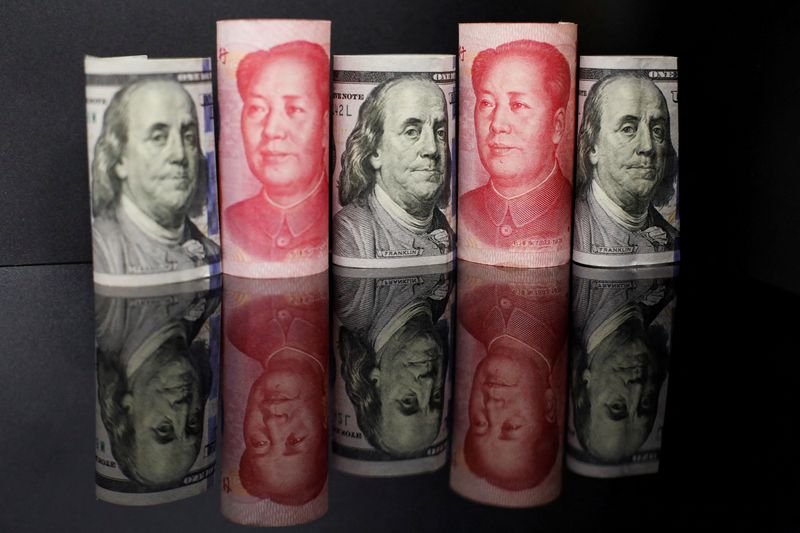By Winni Zhou and Brenda Goh
SHANGHAI (Reuters) - Some Chinese companies are holding on to dollar revenues from exports, while others are turning to foreign exchange hedging in anticipation of a fall in the value of the yuan, according to executives, bankers and data analysed by Reuters.
Several bankers in China told Reuters that clients are reluctant to convert export receipts, while exchange filings show more than 30 A-share listed companies have signed up to use currency derivatives for risk-hedging so far this year.
Central bank data also shows a shift, with dollar deposits at China's commercial banks, which had declined over the past year, jumping by $34 billion in January to $887.8 billion.
The moves are at odds with bank forecasts for a rising yuan in 2023 and broader market expectations that the U.S. dollar will fall this year, and could contribute to yuan weakness.
Ms. Zhu, the owner of a Shanghai-based electronic components exporter, said she is setting aside dollars, betting that her management of some $7 million annual inflow of the U.S. currency will prove crucial to the profitability of her company.
"I may need to convert some dollars into yuan to make payments to domestic suppliers," said Zhu, who prefers to go by her last name. "(But) it feels like I should keep some dollars on hand, as the yuan will depreciate further."
Others anticipating a bumpy ride ahead for the Chinese currency include China Southern Airlines.
China's largest carrier by fleet size said in a Feb. 28 stock exchange filing that it planned up to $4 billion worth of currency hedging in 2023 to "smooth out exchange gains and losses", up from $850 million last year.
Such moves are perhaps not surprising given yuan volatility since Beijing suddenly unwound its zero-COVID strategy. The currency hit six-month highs in January, before dropping close to the closely-watched 7 per dollar level.
The yuan last traded at 6.9085 to the dollar.
In response to faxed questions on the yuan weakening past 7 to the dollar, the People's Bank of China (PBOC) directed Reuters to comments by its governor Yi Gang who said the level is not a "psychological barrier".
"Over the past five years, the exchange rate has been volatile, with a volatility rate of about 4%. And such a volatility rate is about the same as major economies," he said.
"Overall, yuan exchange rate will remain basically stable at reasonable levels," he added at a March 3. news briefing.
'BENIGN'
The yuan had its worst year in 2022 since China unified market and official exchange rates in 1994, dropping nearly 8% as rising U.S. interest rates diverged from falling Chinese ones, supporting dollar gains.
Now the prospect of Chinese tourists using foreign exchange for their trips abroad, fresh concerns that U.S. interest rates might rise further and geopolitical tensions keeping investment flows away from China are all weighing on the currency.
"It's possible to see the yuan go past the 7-mark against the dollar in the near term given the escalating geopolitical tensions between China and the U.S.," said Tommy Wu, senior China economist at Commerzbank (ETR:CBKG).
"Still, the yuan could stabilise somewhat if the upcoming economic data shows continued improvement in the economy."
China on Sunday set a modest target for economic growth this year of around 5% as it kicked off its annual parliamentary gathering. With the economy staging a steady recovery, this could put a floor under the yuan and ultimately attract inflows.
While Chinese authorities have stepped in to lend support in the past and have already made it pricier to bet against the yuan, markets do not expect intervention in the near term.
"Reaction from the regulator has been benign so far, their tolerance of volatility in the yuan has risen quite a lot since last year," Becky Liu, head of China strategy at Standard Chartered (OTC:SCBFF) Bank, said.
And unlike in 2022, the PBOC does not seem to be using the daily setting of the currency trading band to lend support.
"We do not think the central bank will defend 7 as CFETS stays strong at around 100," said Lemon Zhang, FX strategist at Barclays (LON:BARC), referring to the trade-weighted CFETS index.
This gauge of the yuan's value against its major trading partners is up about 2% this year.
Zhang expects the yuan to hold at 7 per dollar until the end of June, before strengthening to 6.7 at the end of the year.
Ju Wang, head of Greater China FX and rates strategy at BNP Paribas (OTC:BNPQY), said she still holds short yuan positions against the dollar, although she does not expect significant weakness.
($1 = 6.9009 Chinese yuan)
